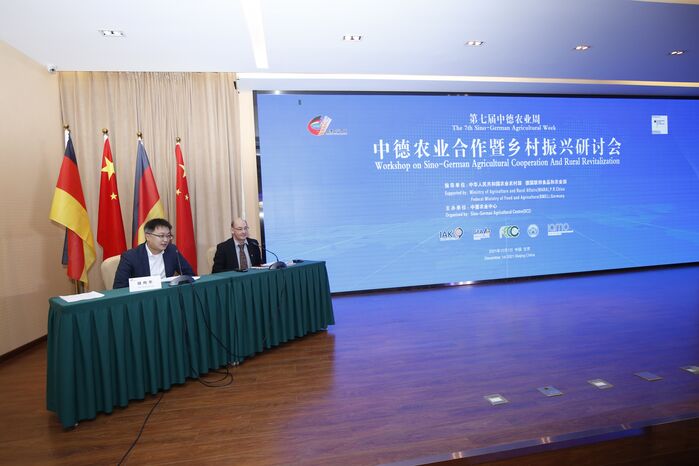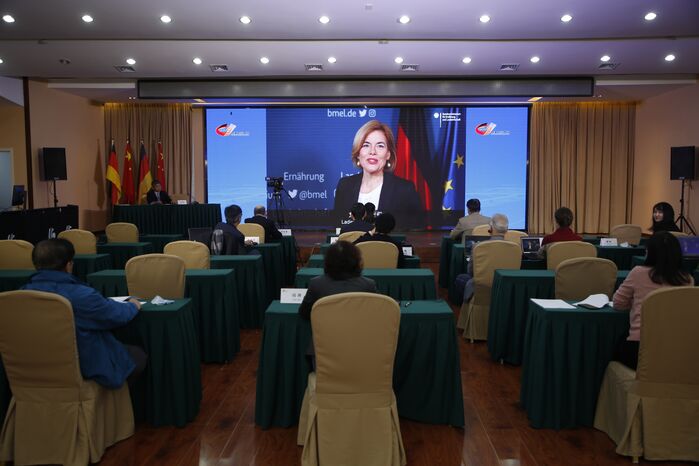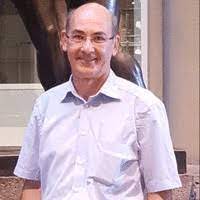In the context of the bilateral cooperation between the German Federal Ministry for Food and Agriculture (BMEL) and the Chinese Ministry of Agriculture and Rural Affairs (MARA) the 7th Sino-German Agricultural Week (DCAW) was held from 1 to 2 December 2021 in Beijing. As the Corona situation is still continuing, the DCAW was organized as an online event with only staff and moderators present in the premises of the Foreign Economic Cooperation Center (FECC) in Beijing.
The event was jointly supported by MARA and BMEL and organized by the Sino-German Agriculture Centre (DCZ). The two-day event consisted of 2 thematic sessions:
- Workshop on Sino-German Agricultural Cooperation and Rural Revitalization
- Workshop on Sino-German Digital Agriculture Solution
The DCAW was effectively broadcasted online and the number of viewers in China reached about 4,000 to 5,000. Furthermore, the event was followed online on the Zoom platform by about 80 participants on each of the two days. High-level representatives from politics, science and agribusiness of both countries participated in this event and contributed online or with recorded video messages. Representatives from various companies showcased their solutions to agricultural digital modernization and their contribution to the revitalization of rural areas.
Mr. Zhang Lubiao, Director General of the Foreign Economic Cooperation Centre (FECC), chaired the opening session of the event and welcomed the online audience. Mr. Ma Youxiang, Vice Minister of MARA delivered a recorded opening speech in which he stressed the increasing importance of smart farming in China and its possible contribution to a green development of the agriculture sector. Mrs. Julia Klöckner, acting Minister of BMEL, delivered a pre-recorded opening address in which she elaborated about the wide range of BMEL-supported projects to foster rural development in Germany. She also praised the ongoing Sino German collaboration and was hopeful that the successful cooperation in the field of animal husbandry will be continued as well. The workshop on Sino-German Agricultural Cooperation and Rural Revitalization saw a wide range of presentations with many examples for successful rural revitalization in several Chinese provinces as well as the progress made in the development of digital villages in China. In a keynote speech, Mr. Liu Qi, Special Researcher in the Counsellor’s Office of the State Council and former Deputy Secretary General of Anhui Province, put rural revitalization as a key strategy to achieve national rejuvenation into a historical context and included it into the five engines driving China’s economic development, along with the household contract responsibility system, the resumption of college entrance exams, opening-up and the private economy. Dr. Michael Klaus, Representative of the Hanns-Seidel Foundation, emphasized the need for cross-sectoral approaches to align rural development with the attainment of the Sustainable Development Goals. Professor Wen Tiejun stressed that rural areas have always played an important role and analyzed it from the perspective of rural construction: rural revitalization could lay the foundation for national ecological transformation. Professor Sun Qingzhong of the China Agricultural University introduced practical cases of “rural community university” and protection of agricultural cultural heritage which could provide an impetus for rural revitalization. Dr. Tobias Federwisch of the German Federal Office of Agriculture and Food introduced the role of the “Federal Rural Development Scheme” in the task of revitalizing rural areas in Germany and highlighted the trend towards co-working and digitization. In the session on good practices, examples from the provinces of Zhejiang, Guangdong, and Jiangsu were elaborated, and Patrick Paziener, a German expert and alumni of the programme shared his experiences in the Sino-German Agricultural Exchange Programme. Ms. Rita Chen of BAYER Crop Science informed the participants on “new opportunities for agricultural transformation”. The increasing market of trade in farmers’ property rights and its implications for the modernization of the Chinese agriculture sector was presented by Mr. Zhang Kai, General Manager of the Tianjin Rural Assets and Equity Exchange. The first day of the DCAW was finalized with closing remarks by the outgoing Director General of the International Cooperation Department of BMEL, Mr. Friedrich Wacker, who reflected on the establishment and development of the Sino German Agricultural Centre in 2015 to which he contributed to a significant extent.
The Director General of the Department of Market and Informatization, Chinese Ministry of Agriculture and Rural Affairs (MARA), Mr. Chen Yong, and Mrs. Engel Hessel, Director General, Rural Development and Digital Innovation, BMEL, represented the two ministries in their opening speeches to the workshop on Sino German digital agriculture solutions on the second day of the DCAW. Mr. Chen pointed out that the digitization of the Chinese society has already made much progress with a 90% coverage of the 4G mobile phone technology across all rural areas in China. The internet is used by around 140 million households. Professor Engel Hessel mentioned that the increased digitization in agriculture will offer more solutions to face challenges like the Climate Change and achieving Food Security at a global scale. She also called for a closer collaboration between the two countries in the field of digital innovations as both countries are already leading players in this topic. Two of 14 BMEL funded Digital Experimental fields were introduced by Professor Roland Gerhards, University of Hohenheim, and Professor Patrick Noack, University of Applied Sciences Weihenstephan-Triesdorf. Both projects which are part of the 14 showcases of digital innovations at farm level in cooperation with federal research institutions, local universities and model farms. In a thought-provoking presentation, Dr. Zscheischler from the Center for Agricultural Landscape and Land Use Research (ZALF) raised questions about possible unintended side effects of the widespread use of digital technology and called for a thorough risk analyses before the adoption of any technology. Dr. Maximilian Deutsch of the Saxony State Ministry for Energy, Climate Protection, Environment and Agriculture outlined the experiences of digitalization in agriculture in the Federal State of Saxony. The opportunities and challenges in digitization in horticulture were the topic of Dr. Manuela Zude-Sasse’s presentation. The Chinese speakers informed about the latest developments in intelligent agricultural machinery, digital equipment as well as new experiences with cloud-based applications and fully integrated digital innovation in the production of tomatoes and waxberries. Mr. Zhao Chunjiang, acclaimed Academician from the National Engineering Research Center for Information Technology in Agriculture, sees the current wave of digitization in agriculture as the 3rd Green Revolution and predicts that future machinery in agriculture will not grow in size any further, but the machines will become more adaptive. Dr. Sheng Yaohui, Deputy General Manager, Department of Agriculture and Rural Affairs of Huawei company illustrated the growing involvement of modern tech companies in the agriculture sector in China. The company not only provides the 5 G network to all rural communities but is also developing Artificial Intelligence Technologies for its use in animal husbandry (e.g., detection of individual pigs through face recognition) and devices which can provide real time test results of soil samples while applying mineral fertilizers to crops. Finally, Dr. Lena Kuhn from the Leibniz Institute of Agricultural Development in Transition Economies (IAMO) informed the audience about her institute´s latest research project about the digital transformation of China’s agriculture – resources, trade and food security (DITAC). An intersectoral approach to learn more about the potentials of China’s digital agricultural sector and its possible implications to other transition economies.
The two days of the DCAW were respectively moderated by Dr. Hu Xiangdong, Deputy Director of the Institute of Agricultural Economics and Development in the Chinese Academy of Agricultural Sciences (CAAS), and Professor Wu Wenbin, Deputy Director of the Institute of Agricultural Resources and Regional Planning in CAAS.
Download the event brochure here.
- History and reality of rural development in China, WEN Tiejun
- Cultural foundation of rural revitalization, SUN Qingzhong
- Revitalization of rural areas in Germany, Federwisch
- Practices from Guangdong province, LUO Huilan
- Practices from Huizhou city, Zhejiang province, SHI Jing
- Digital villages in Jiangsu province, XU Pingguan
- Sino-German Agricultural Exchange Programme, Paziener
- Exchange and trading of property rights, ZHANG Kai
- BASF, Menne
- Huawei, SHENG Yaohui
- Agriculture and digitalization in Saxony, Germany
- Bayer, LU Shixue
- Experimental field, DiWenkLa, Gerhards
- Agricultural big data, SUN Tong
- CLAAS, Trendowitz
- Digitalization in horticulture: opportunities and drawbacks, Zudesasse
- Waxberry industry in Xianju county, Zhejiang province
- DITAC project, Kuhn
- Tsingsky vegetable factory, WANG Xiaoqing
For more information on the 14 BMEL-funded Experimental Fields see also the website on Smart Agriculture by DCZ.






